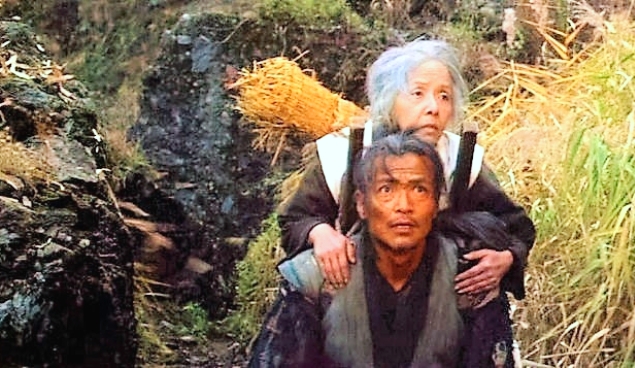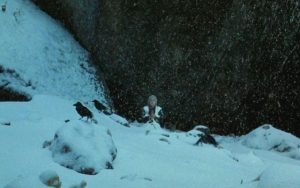
A despairing masterpiece, but with a keenness for sociology one watches with morbid fascination. The Ballad of Narayama (1983, Japan) appears to be a roughhewn but tranquil depiction of nineteenth century life in the mountains of Japan where families adhere to duties to keep the community functioning, only for the film soon to reveal its shocking scenario: When an elder reaches the age of 70 in this oft-famine stricken village, their oldest son is to carry their parent to the top of the mountain in winter and abandon them until they die, as an appeasement to the gods, with the hope that a generous harvest returns to them in the spring.
No one vocally objects to this tradition. If there is complaint of any kind, it is done quietly and away from others. Everybody in the village knows each other’s business, so it’s in every person’s best interest to not stir up dissension. The social rules of this clan have been going on for hundreds of years, and to not be in outcast, every person is best off to stay in line.
I have just seen the movie for the second time after it has been about fifteen years the first time I saw it. I was stunned by the graphic sexual nature of the film, I could not believe I did not remember it being that way. In the film, only the first-born living sons are allowed to marry and take a wife while all secondary sons are supposed to toil and support the family. There is an astonishing sneaking around by all the younger siblings with other women in the village, all surreptitiously. To me, there seems to be a lot of sexual repression in this society – and then desires blow in spurts, and men and women run off into the woods or in the dark of night to conduct their “secret” affairs.
There is one disliked middle-aged man in the village who is known as a virgin (also known as “stinky”) and he gets to the point he will do anything for a woman. He has the means to threaten the community that he is going to ruin the food supply if he doesn’t get a woman, and so one woman has to be chosen to submit. The younger women refuse, and one of the older woman chooses to appease him. The scene has her feeling unpleasant during the act, but does it in surrender for all. A handful of the other men in the village can beg for sex as if they are begging for mercy.
The two main characters are Tatsuhei (Ken Ogata) and Orin (Sumiko Sakamoto), the son and a mother who is 69 and proud to be on the eve of submitting to ubasute, the word for dying in the mountains. Tatsuhei is a strapping built son who has lost interest in sex and lust, and is simply compelled to keep his family healthy and well. Orin is both a wise mother who we trust in large part kept this village running most of her life, and yet her devotion to old rituals suggests zealotry. Orin bashes her front teeth out deliberately so she can inform the others that she is decaying anyway and that her time is coming – as if it will soften the blow to the sons who will miss her.
In one scene, a thief and wife have been caught with a large stolen batch of potatoes that they planned to ration amongst themselves for several seasons. It’s enough to feed a village for a month. The punishment for the two is death, and the sentence is played out immediately and brutally (it’s not a way anybody would want to die). It doesn’t end there. There is discussion the next day by the decision-makers of the villagers that all blood relatives should be executed as well. That means the thief’s daughters shall be brought to termination, too. The husbands to the thief’s daughters are quick to object, but being loud in their protests will not get them anywhere.
 The film’s final section is a prolonged journey to Narayama. Tatsuhei is strong enough to carry his mother up some very rugged terrain that is both gorgeous and forbidding. The abandonment site turns out to be completely out of the normal, at least out of the kind of normal you’re used to seeing. With its jumble of skeleton bones and marauding flock of black crows, it is certainly a death camp but one where each person dies solo. Tatsuhei does not want to let go of his mother and showers her with praise. He wants confirmation from her. She wants to die with dignity and for her son to return home with not sobs of regrets but with dignity. We do see in the film another son who carries a father who does not want to die with dignity. Orin, however, seems to know what it is expected of her. Tatsuhei questions the tradition, but Orin prefers him not to speak.
The film’s final section is a prolonged journey to Narayama. Tatsuhei is strong enough to carry his mother up some very rugged terrain that is both gorgeous and forbidding. The abandonment site turns out to be completely out of the normal, at least out of the kind of normal you’re used to seeing. With its jumble of skeleton bones and marauding flock of black crows, it is certainly a death camp but one where each person dies solo. Tatsuhei does not want to let go of his mother and showers her with praise. He wants confirmation from her. She wants to die with dignity and for her son to return home with not sobs of regrets but with dignity. We do see in the film another son who carries a father who does not want to die with dignity. Orin, however, seems to know what it is expected of her. Tatsuhei questions the tradition, but Orin prefers him not to speak.
You finish the film and wonder: how many more decades would go until this clan decides their draconian rituals are unnecessary?
Cannes Film Festival Palm D’Or winner in 1983. Director Shohei Imamura’s other great film is 1979’s “Vengeance is Mine,” about contemporary Japan’s most infamous serial killer.
129 Minutes. Rated NR. Japanese with English subtitles.
HISTORICAL DRAMA / ADULT ORIENTATION / MASTERPIECE
Film Cousins: “Ikiru” (1952, Japan); “The Ballad of Narayama” (1958, Japan); “Vengeance is Mine” (1979, Japan); “Silence” (2016).





